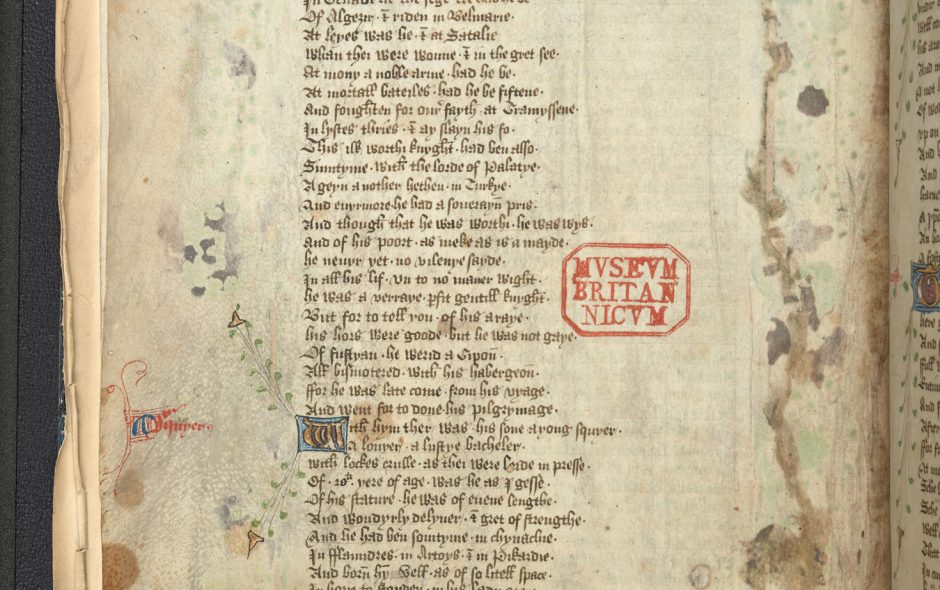Translation into Spanish of an extract from the The Canterbury Tales prologue, written by Geoffrey Chaucer at the end of the 14th century. The tales, written in Middle English, tell the story of a group of 31 pilgrims who meet while travelling from the Tabard Inn in Southwark to the shrine of St. Thomas Becket in Canterbury. To pass the time on the journey, they decide to each tell two tales to the assembled company on the journey there and the journey home. The result is regarded as a masterpiece of medieval literature; The Canterbury Tales holds a central place in the English literary canon. Reference and further information on this site.
Extract from The Canterbury Tales prologue
When April with his showers sweet with fruit
The drought of March has pierced unto the root
And bathed each vein with liquor that has power
To generate therein and sire the flower;
When Zephyr also has, with his sweet breath,
Quickened again, in every holt and heath,
The tender shoots and buds, and the young sun
Into the Ram one half his course has run,
And many little birds make melody
That sleep through all the night with open eye
(So Nature pricks them on to ramp and rage)-
Then do folk long to go on pilgrimage,
And palmers to go seeking out strange strands,
To distant shrines well known in sundry lands.
And specially from every shire’s end
Of England they to Canterbury wend,
The holy blessed martyr there to seek
Who helped them when they lay so ill and weak.
Befell that, in that season, on a day
In Southwark, at the Tabard, as I lay
Ready to start upon my pilgrimage
To Canterbury, full of devout homage,
There came at nightfall to that hostelry
Some nine and twenty in a company
Of sundry persons who had chanced to fall
In fellowship, and pilgrims were they all
That toward Canterbury town would ride.
The rooms and stables spacious were and wide,
And well we there were eased, and of the best.
And briefly, when the sun had gone to rest,
So had I spoken with them, every one,
That I was of their fellowship anon,
And made agreement that we’d early rise
To take the road, as you I will apprise.
But none the less, whilst I have time and space,
Before yet farther in this tale I pace,
It seems to me accordant with reason
To inform you of the state of every one
Of all of these, as it appeared to me,
And who they were, and what was their degree,
And even how arrayed there at the inn;
And with a knight thus will I first begin.
A knight there was, and he a worthy man,
Who, from the moment that he first began
To ride about the world, loved chivalry,
Truth, honour, freedom and all courtesy.
Full worthy was he in his liege-lord’s war,
And therein had he ridden (none more far)
As well in Christendom as heathenesse,
And honoured everywhere for worthiness.
At Alexandria, he, when it was won;
Full oft the table’s roster he’d begun
Above all nations’ knights in Prussia.
In Latvia raided he, and Russia,
No christened man so oft of his degree.
In far Granada at the siege was he
Of Algeciras, and in Belmarie.
At Ayas was he and at Satalye
When they were won; and on the Middle Sea
At many a noble meeting chanced to be.
Of mortal battles he had fought fifteen,
And he’d fought for our faith at Tramissene
Three times in lists, and each time slain his foe.
This self-same worthy knight had been also
At one time with the lord of Palatye
Against another heathen in Turkey:
And always won he sovereign fame for prize.
Though so illustrious, he was very wise
And bore himself as meekly as a maid.
He never yet had any vileness said,
In all his life, to whatsoever wight.
He was a truly perfect, gentle knight.
But now, to tell you all of his array,
His steeds were good, but yet he was not gay.
Of simple fustian wore he a jupon
Sadly discoloured by his habergeon;
For he had lately come from his voyage
And now was going on this pilgrimage.
Extracto del prólogo de Los cuentos de Canterbury
Cuando abril y sus dulces lluvias con sabor a fruta combatan la sequía de marzo hasta la raíz y recorran cada conducto con ese poderoso licor para, así, engendrar y dar vida a las flores; cuando también Céfiro con su dulce aliento atraviese cada bosque y cada monte una vez más, y logre, de esa manera, insuflar los tiernos brotes y capullos; cuando el joven sol transite la mitad de su itinerario del Carnero; cuando, además, se oiga la melodía de muchas aves pequeñas, aves que duermen durante toda la noche con un ojo abierto —para que la Madre Naturaleza pueda ponerlas en guardia de un solo espolón; cuando todo ello sucede, mientras la naturaleza revive, el pueblo ansía salir a peregrinar y los palmeros salir en busca de tierras extrañas hacia santuarios famosos en regiones diversas. Y, en especial, desde los rincones de cada condado de Inglaterra, los viajeros se dirigen a paso lento hacia Canterbury, al encuentro del mártir canonizado que los ayudó cuando se sentían tan enfermos y débiles.
Cierto día al atardecer durante aquella estación, mientras reposaba ya listo para comenzar mi peregrinación hacia Canterbury —motivado por una lealtad devota—, se acercaron a esa taberna de Southwark un grupo de veintinueve peregrinos a quienes el destino había reunido y quienes compartían el mismo objetivo de ir hasta Canterbury.
Los cuartos y las caballerizas de la taberna eran espaciosos, por lo que todos nos sentíamos cómodos y muy a gusto. Y sin esperar demasiado, una vez el sol se hubo ocultado, hablé con ellos, con cada uno, y les expresé mi deseo de peregrinar a su lado. Así, acordamos que, al otro día, nos levantaríamos temprano para emprender el viaje, como ya les contaré más adelante.
Pero ahora, mientras tenga tiempo y espacio y antes de seguir avanzando con esta historia, creo que es fundamental contarles un poco sobre la situación de cada una de estas personas, a través de mi mirada, por supuesto: quiénes eran, qué títulos tenían y hasta cómo se agrupaban en la taberna. Y comenzaré por hablarles sobre un caballero.
Había un caballero; era un hombre honorable. Desde el momento en que empezó a recorrer el mundo, abrazó con fervor valores como la caballerosidad, la verdad, el honor, la libertad y la cortesía.
Luchó con gran dignidad durante la guerra de su señor feudal y, desde entonces, ha viajado tanto hasta sitios donde se profesa la fe cristiana como hasta tierras paganas. Nadie ha llegado más lejos que él. En cada uno de los lugares que visitó, fue homenajeado por su valía, solía tener el honor de sentarse en la cabecera de la mesa y, en el mar Mediterráneo, asistió a muchas reuniones de la alta sociedad.
Participó en la victoria de la batalla de Alejandría y venció a todos los caballeros en Prusia. Luchó en Latvia y en Rusia. Colaboró en el asedio de la lejana Granada, estuvo en Algeciras y en Belmarie y en las victorias de Ayas y Antalya. Peleó en quince batallas mortales y luchó por nuestra fe en Tremecén. Se enlistó en el ejército tres veces y, en las tres ocasiones, aniquiló a sus enemigos. No hay hombre de fe cristiana que haya obtenido tantas victorias como él. Además, este mismo valeroso caballero, en una oportunidad, luchó contra los paganos de Turquía junto al señor de Palatye, quien siempre lo tuvo en gran estima.
A pesar de ser una persona ilustre, era, también, muy sabio y muy humilde. No fue grosero jamás, nunca en toda su vida le pronunció palabras desagradables a ser viviente alguno. Era un verdadero caballero, perfecto y gentil. No obstante, para describirlo por completo, debo decir que tenía buenos corceles, pero que él no se veía jovial. Llevaba una sobreveste de un fustán sencillo lamentablemente descolorido por la joruca, ya que venía de un viaje y ahora emprendía este otro peregrinaje.

